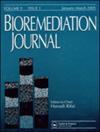菲降解菌群NS-PAH-2015-PNP-5的分子多样性及功能表征
IF 1.9
4区 环境科学与生态学
Q3 ENVIRONMENTAL SCIENCES
引用次数: 1
摘要
本文章由计算机程序翻译,如有差异,请以英文原文为准。
Elucidation of molecular diversity and functional characterization of phenanthrene degrading consortium NS-PAH-2015-PNP-5
Abstract Phenanthrene (PHE) is a hazardous low molecular weight PAH and widespread ecological contaminant. In the present study, the Illumina Miseq platform explored the bacterial diversity of the efficient PHE degrading consortium NS-PAH-2015-PNP-5, developed from the petrochemical contaminated soil near the Indian Oil Corporation Limited refinery, Panipat (India). Total 273 OTUs represented the species diversity identified in NS-PAH-2015-PNP-5. Nineteen major bacterial species covered approximately 99.22% of the total α-diversity of NS-PAH-2015-PNP-5. In NS-PAH-2015-PNP-5, the Shannon alpha diversity (H') and Pielou's Evenness Index (J') were calculated at 2.43 and 0.43, respectively. Moreover, an overwhelming population of phylum Proteobacteria (99.28%) and Pseudomonas spp. (32.25%) were observed in NS-PAH-2015-PNP-5. Two culturable isolates, PAH 51 and PAH 52, were isolated from the NS-PAH-2015-PNP-5, and the result of 16S rRNA analysis showed homology with Bacillus wiedmannii (96.7%) and Achromobacter pulmonis (99.24%), respectively. The results of the carbohydrate utilization test showed that NS-PAH-2015-PNP-5 was able to metabolize dextrose, L-arabinose, ONPG, esculin, citrate, and malonate. Detection of phthalic acid metabolite by the GCMS analysis inferred that NS-PAH-2015-PNP-5 bio-degraded the PHE through the protocatechuic acid pathway. During the seven-day biodegradation experiment at the optimized physicochemical conditions, NS-PAH-2015-PNP-5 degraded 62%, 70%, 90% PHE after the third, fifth, and seventh day, respectively. Graphical Abstract A foremost population of phylum Proteobacteria was identified in NS-PAH-2015-PNP-5. The culturable isolates of NS-PAH-2015-PNP-5 (PAH 51 and PAH 52) didn't utilize PHE as the carbon source. Biodegradation of PHE by the NS-PAH-2015-PNP-5 was accomplished through the protocatechuic acid pathway. Pseudomonas spp. were the most abundant species of the total α-diversity of NS-PAH-2015-PNP-5.
求助全文
通过发布文献求助,成功后即可免费获取论文全文。
去求助
来源期刊

Bioremediation Journal
ENVIRONMENTAL SCIENCES-
CiteScore
5.30
自引率
0.00%
发文量
36
审稿时长
9 months
期刊介绍:
Bioremediation Journal is a peer-reviewed quarterly that publishes current, original laboratory and field research in bioremediation, the use of biological and supporting physical treatments to treat contaminated soil and groundwater. The journal rapidly disseminates new information on emerging and maturing bioremediation technologies and integrates scientific research and engineering practices. The authors, editors, and readers are scientists, field engineers, site remediation managers, and regulatory experts from the academic, industrial, and government sectors worldwide.
High-quality, original articles make up the primary content. Other contributions are technical notes, short communications, and occasional invited review articles.
 求助内容:
求助内容: 应助结果提醒方式:
应助结果提醒方式:


